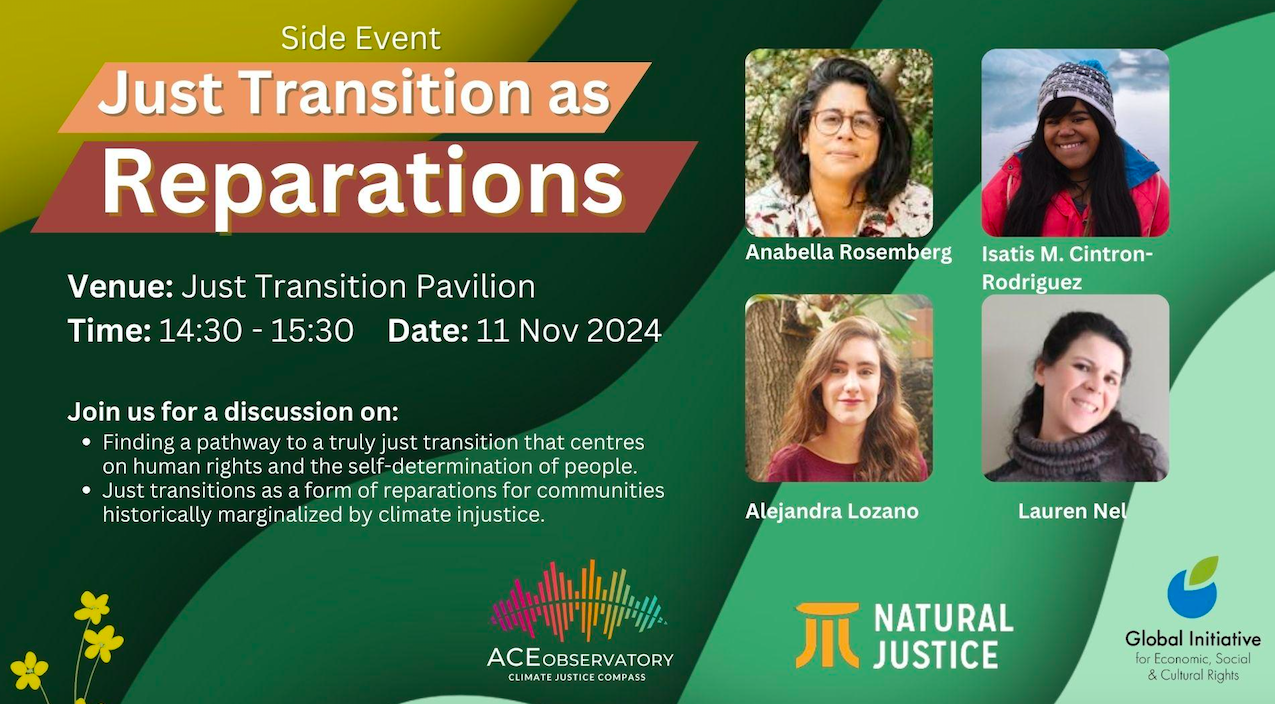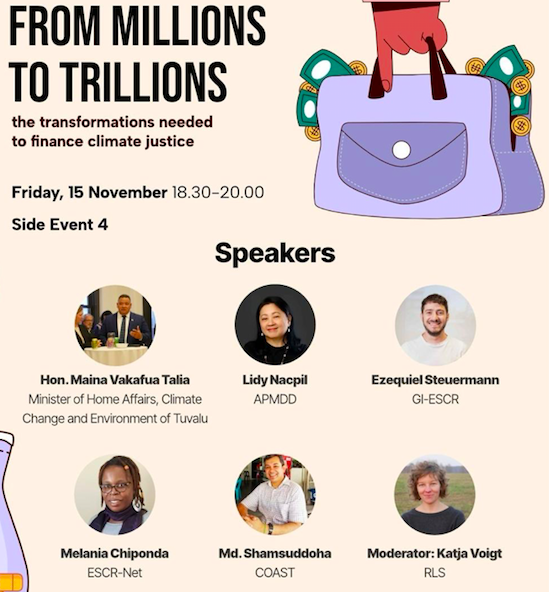On the Ground
Explore our work with partners, globally and locally, to tackle social and economic injustice using a human rights lens.

29th Session of the Conference of the Parties to the United Nations Framework Convention on Climate Change (COP29) Wrap Up!
We were present at the 29th session of the Conference of the Parties to the United Nations Framework Convention on Climate Change (COP29), which was held from 11 to 22 November in Baku, Azerbaijan.
We organised and convened jointly with partners a series of events and spaces to advance a human approach to climate finance and advance a just transition centred on the needs of people and the planet.
Human Rights and Climate Change Working Group
On 10 November, jointly with the Centre for International Environmental Law (CIEL), we co-hosted a Human Rights and Climate Change Working Group strategy session to discuss priorities and actions and articulate activities with member organizations for COP29. The session was attended by 23 different organisations and contributed to sharing concerns and planning advocacy strategies to push for human rights-aligned outcomes in climate negotiations.
During the meeting, we promoted a conversation with member organisations to identify key issues to ground the concept of Just Transition from a human rights lens. This will be the basis for GIESCR's future work to advocate for a Just Transition Work Programme centred on human rights norms and principles that can deliver an effective climate policy that advances conditions of socioeconomic well-being and prevents abuses in economy-wide transformations.

Just Transition as Reparations
On 11 November, as part of the programme of the International Labour Organisation Just Transition Pavillion, we held a side event entitled "Just Transition as Reparations," co-hosted with partner organisations ACE Observatory, Natural Justice, and CAN International aimed at discussing how just transition pathways should encompass reparations and access to justice for human rights violations committed by the impacts of the climate emergency, as well as by measures articulated to address the climate breakdown.
During the event, we participated in making an intervention focused on the human rights framework's role in advancing a just energy transition in this context.

COP 29: Balance in the Area of Climate Finance
As part of the Latin American and Caribbean Network for Sustainable Financial System (REDFIS), we were invited to participate in a virtual press conference on 15 November to update Latin American civil society and journalists on the developments at the end of the first week of negotiations in Baku. In light of the active resistance of Global North countries to commit to a higher ambition in terms of the climate financing targets that were determined under the New Collective Quantified Goal, we focused our intervention on explaining the human rights implications of such hesitancy and the need to bolster a higher degree of public pressure from the Latin American region. Among other initiatives, we invited the audience to form part of the #DateCuenta campaign, which GI-ESCR has spearheaded, as well as to draw attention to parallel debates unfolding at the G20 with regard to progressive fiscal reforms with a climate financing angle.

COP 29 Official Side-Event: 'From Millions to Trillions: The Transformations Needed to Finance Climate Justice'
Alongside partner organisations such as the Rose Luxembourg Foundation, AIDA, APMDD, ESCR Net, and the Coast Foundation, we participated in the panel of an official side event at COP 29 focusing on the discussions of a New Collective Quantified Goal on Climate Finance.
In such an event, our exposition focused on one of the most significant transformations needed to effectively propel the political will from Global North countries to catalyse ambitious climate action successfully: the transformation of the narratives concerning climate finance from a human rights perspective. Cross-fertilisation between climate and human rights legal regimes and their specific provisions in terms of climate finance was not only highlighted as a way in which to strengthen and complement coexisting legal obligations but fundamentally, as providing a robust and heavily legitimised discourse that may embolden public pressure upon decision-makers to agree upon ambitious financing targets throughout multilateral processes such as COP. Based on a newly published legal brief from GI-ESCR exploring the mentioned intersection between legal regimes, the audience of more than 80 individuals stemming from organisations and negotiating delegations from Asia, Africa, Europe, and Latin America showed great interest in this perspective, leaving the room with increased advocacy capacities and tools for present and future discussions on climate finance, bearing in mind particular milestones of 2025 such as FFD 4, the negotiation of the UN Tax Convention, and upcoming COP 30 in Brazil.

Outcomes of COP29
The outcomes of the climate negotiations failed to meet the rising challenges posed by the escalating climate breakdown that poses an existential threat to all living conditions. Developed countries failed to raise to the world's critical moment by adopting a desperately low agreement to mobilise only $300 billion by 2025 to address the needs of developing countries and the communities at the frontline of the worst impacts of the climate emergency. Developing countries had requested at least $1.3 trillion in annual finance to carry out the system-wide transformations required to build climate resilience and avert the worst consequences of the climate emergency. The quantum that came up from Baku is highly inadequate and radically fails to provide guidance on the sources or quality of the funding to be mobilised. Furthermore, it does not incorporate critical human rights standards to guarantee the provisioning of resources that prioritise those most at risk and for climate-financed projects to adopt proper safeguards. The New Collective Quantified Goal undermines urgent calls made by the most affected and least responsible for the crisis for current and historic polluters to pay for immediate climate action, including mitigation, adaptation, loss, and damage, and to achieve a just transition towards low-carbon societies.
Following a similar thread, the Just Transition Work Programme negotiations did not yield any meaningful consensus at COP29. Despite all efforts, no decision was adopted to move beyond the already established series of annual dialogues to exchange good practices and a High-Level Ministerial conversation on the topic. Concrete and more actionable results are imperative to push for just transition frameworks to drive climate action at both the national and international levels. This workstream remains critical to discuss pathways to ensure climate policy advances social and economic justice and is aligned with human rights standards. The rapid shift towards low-carbon societies can only be achieved if it also provides better well-being conditions for the most marginalised and the costs and benefits of the transformation are fairly shared. The Just Transition Work Programme is a critical space to continue the conversation on rising socioeconomic inequalities that need to be addressed in climate policy design and implementation.
On gender equality, the Enhanced Lima Work Programme on Gender was extended for 10 years to ensure the mainstreaming of gender equality across all UNFCCC workstreams. This included a clear roadmap to develop a Gender Action Plan towards COP30. Nevertheless, critical references to human rights and intersectionality were stripped down from the text. It is imperative to ensure an intersectional perspective is set at the heart of the new Gender Action Plan that acknowledges the needs, realities, and experiences of women in all their diversity and gender diverse persons that are not only disproportionately affected by the climate crises but on the solutions to deliver on effective climate action. Furthermore, the new Gender Action Plan must recognise the climate-care nexus and contribute to ensuring that climate policy supports care systems that tackle the root causes of gender inequality.
We will work with partners on these essential agendas to achieve the transformations necessary to create a future where human rights are realised for all and in harmony with nature.




